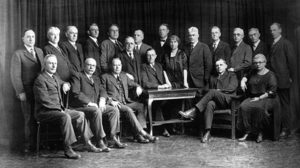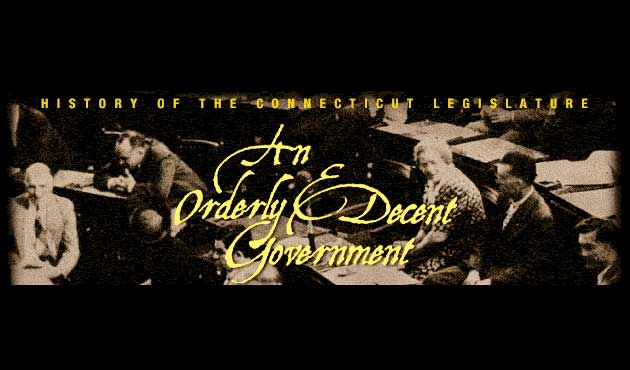Women Win the Right to Vote
With war’s end, suffrage advocates stepped up their campaign for equal rights and finally saw Congress pass the 19th Amendment giving women the right to vote. Fearing that 200,000 new voters would disrupt Republican control, J. Henry Roraback urged Connecticut’s Congressional delegation not to support the amendment and rejected all calls for a special session of the General Assembly to ratify it. Only after the necessary 36 states had already approved the amendment did Connecticut act.
“It would be better for the country if we could cut the vote we have in two rather than add women to it.”
– Governor Marcus Holcomb, 1919

Appropriations Committee
Despite his antagonism to suffrage, once women won the right to vote, Roraback sought to add them to the Republican electoral base. In 1920, three Republican women won election to the House along with one Democrat and an Independent. Four years later, Republican Alice Merritt became the first female state senator.
Roraback ignored minority Democrats in the legislature. Important committee assignments went to his trusted small-town allies. The entire 1925 Appropriations Committee was made up of Republicans and included no representatives from the state’s five largest cities.
“It’s one of those things that will spread. We’ll give it to them and then sometime in the future you’ll have joint representation. And don’t forget the people elected Republicans to do the job!”
– J. Henry Roraback on the question of placing
Democrats on legislative committees
From his offices on the third floor of Hartford’s Allyn House Hotel, Roraback controlled executive and judicial appointments, nominations for higher office, state appropriations and other actions of the legislature.
The Roraback machine reached its peak in the election of 1926, virtually driving the Democrats from the Senate and establishing an overwhelming Republican majority in the House.
This article is a panel reproduction from An Orderly and Decent Government, an exhibition on the history of representative government in Connecticut developed by Connecticut Humanities and put on display in the Capitol concourse of the Legislative Office Building, Hartford, Connecticut.
<< Previous – Home – Next >>








